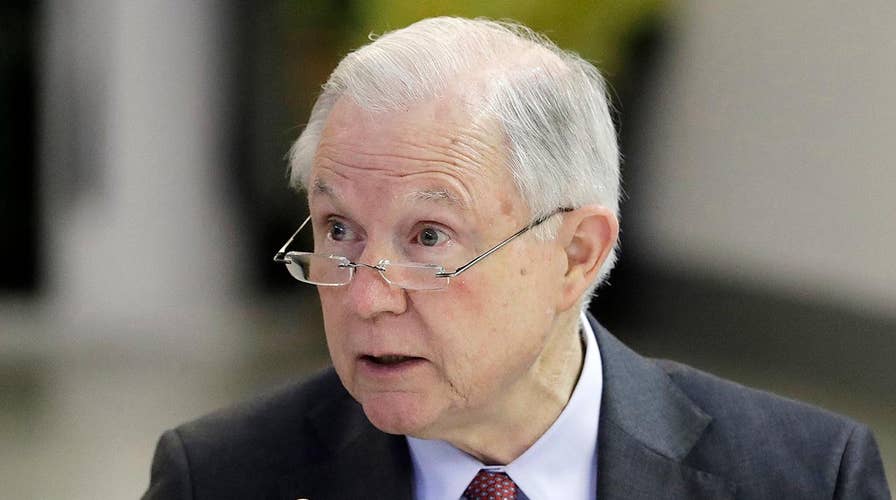DOJ reviewing Uranium One deal, Clinton Foundation
Catherine Herridge reports on considerations into opening formal investigations.
No person in this country is so high that he or she is above the law. This includes Hillary Clinton.
There is no station in life or standing in government or political aspiration that absolves someone from criminal conduct. In this way, we are all creatures of the law and are bound to obey it. An orderly society cannot function if it permits individuals to disregard the law with impunity.
This fundamental principle, enunciated by the U.S. Supreme Court more than a century ago, is what gives sustenance to our democracy. Without it, lawlessness, chaos and tyranny at the hands of the few would inexorably ensue.
It follows, then, that Clinton is no higher or lower than any American. She must abide by the rule of law regardless of her condition or circumstance. Running for high office, including the presidency, does not somehow establish an entitlement to legal absolution.
Yet, this essential doctrine seemed to be entirely lost on Democrats during Tuesday’s hearing by the House Judiciary Committee in which Attorney General Jeff Sessions testified.
Rep. John Conyers of Michigan, the ranking Democrat, asked the following question: “In a functioning democracy, is it common for the leader of the country to order the criminal justice system to retaliate against his political opponents?”
Sessions responded that “the Department of Justice can never be used to retaliate politically against opponents and that would be wrong.”
Conyers, a notorious partisan, appears to have deliberately misstated both the law and the facts. The Justice Department is duty-bound to investigate acts that appear to have violated criminal statutes. If there is sufficient evidence to support an indictment of charges, our system of justice demands they be brought.
This is not retaliation, as Conyers would have people believe, but the enforcement of laws unimpeded by political motivations.
Clinton is not exempt merely because she ran for the presidency and lost. If that were the case, anyone could rob a bank and be excused from punishment by becoming a candidate for office.
Sessions has been lethargic in determining whether the criminal prosecution of Clinton is warranted. On July 27, Republicans on the House Judiciary Committee sent a letter to the attorney general demanding that he appoint a special counsel to investigate alleged wrongdoing by Clinton in the controversial sale of a uranium company to Russia. Sessions never responded. A second letter in September was also ignored.
Finally, on the eve of his testimony, Sessions advised the committee that he had, indeed, directed senior federal prosecutors to evaluate whether a special counsel is needed. There is compelling evidence that Clinton may have used her office as secretary of state to confer a benefit to the Russian government in exchange for money.
If a “pay-to-play” scheme helped secure the sale of 20 percent of America’s uranium assets to Russia while enriching Hillary Clinton and former President Bill Clinton and their foundation, it would constitute various crimes including bribery, mail fraud, wire fraud and, arguably, racketeering.
The committee has requested that a special counsel also reopen the Clinton email case to ascertain whether actions taken by then-Attorney General Loretta Lynch and then-FBI Director James Comey may have obstructing justice in an effort to exonerate Clinton.
If so, then the question of whether Clinton violated the Espionage Act in mishandling 110 classified documents found on her unsecured and unauthorized personal server must be re-examined for potential criminal charges against her.
As I have argued in columns for several months, the attorney general has no choice but to appoint a special counsel and must do so immediately. During his confirmation hearing on Jan. 10, Sessions vowed to recuse himself from any questions involving “both the Clinton email investigation and any matters involving the Clinton Foundation.”
Therefore, he must hand the entire matter over to a special counsel in order to comply with his promise under oath and to eliminate his admitted conflict of interest.
President Trump has criticized Sessions for his conspicuous failure to pursue investigations into Clinton and others in the Obama administration for their suspected criminality. President Trump was right to do so and is well within his constitutional authority to voice his concern.
It is a complete myth perpetuated by the media – and reiterated by Conyers during Tuesday’s hearing – that a president may not be engaged in criminal cases at the Department of Justice. There is not a single law prohibiting him from directing the department to pursue any matter that merits criminal prosecution.
To the contrary, under Article II of the Constitution the president is specifically empowered to enforce all laws – something often accomplished by instructing the Justice Department to take action. Agencies and departments in the executive branch are not independent. They are constitutionally under the direction of the president. He may tell them what to do and what not to do.
Over the course of our nation’s history, presidents have been intimately involved in both civil and criminal cases. President Thomas Jefferson ordered his attorney general to prosecute Aaron Burr for treason. President John F. Kennedy ordered his Justice Department to intervene in multiple civil rights cases.
A president may not abuse his office to pursue political vendettas under the guise of criminal prosecutions. But where there is sufficient evidence of illegality, he has every right to demand that the law be enforced. His failure to do so would constitute an egregious breach of his constitutional duty.
The more we learn about the machinations of Hillary Clinton and the unscrupulous nature of her dealings as secretary of state and, later, as a presidential candidate, the more we have come to learn that the trajectory of her political career has been punctuated by a sense of privilege and entitlement that transcends the law.
It is time she face the consequences of her actions and the scrutiny of a special counsel.





















